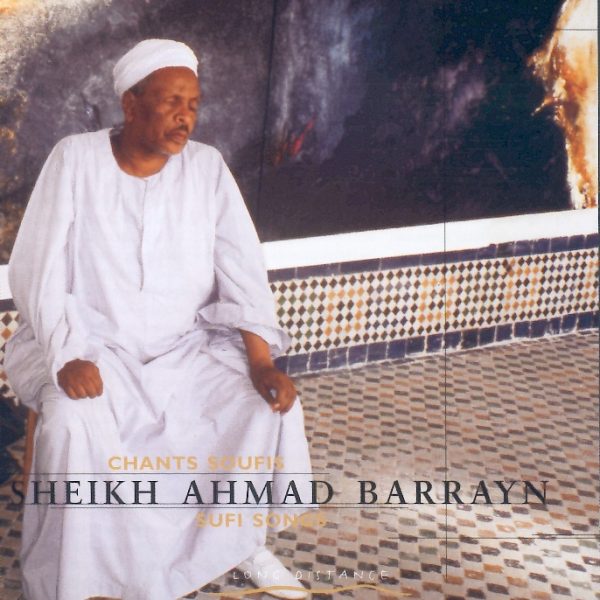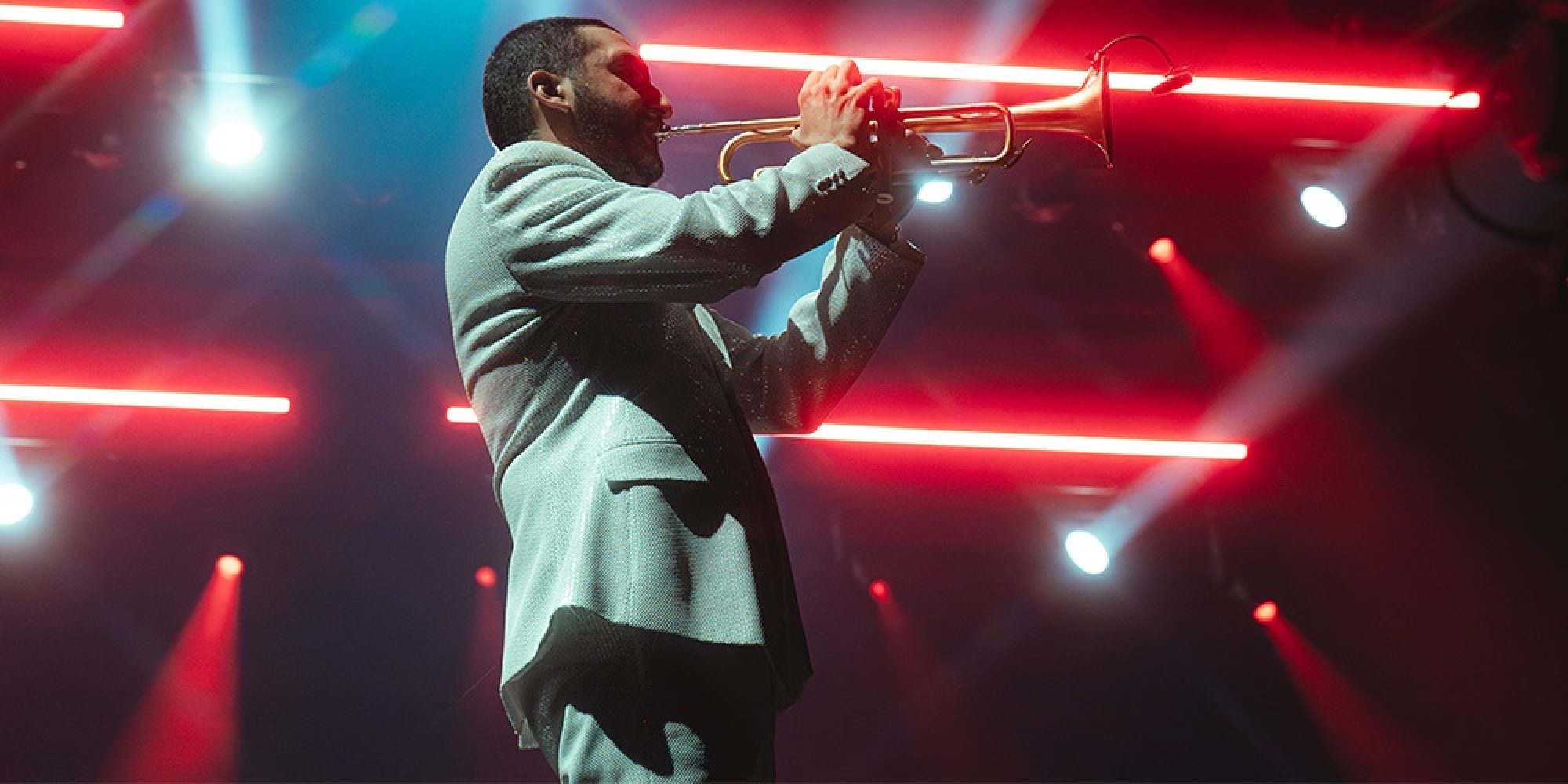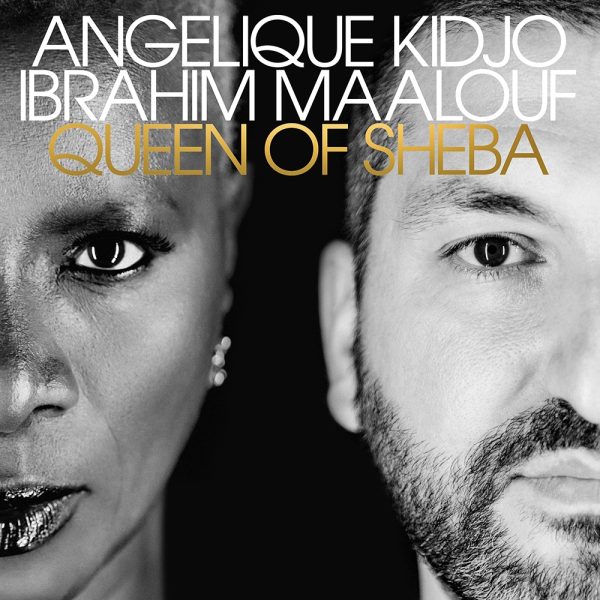Ibrahim Maalouf is shape-shifting Renaissance man. A master of the quarter-tone trumpet, a modified version of the instrument capable of playing Arabic scales (maqamat), Maalouf has performed and recorded classical music, jazz, experimental works, a collaboration with Angelique Kidjo, and other forays into pop music. This year, Maalouf has two new albums, Paris in Love, documenting an epic, sold-out concert held at the iconic Accor Arena in Paris, and also Trumpets of Michel Ange, an album honoring the memory of his musician father. After absorbing these two very different, albums, Afropop’s Banning Eyre called Maalouf to talk about them. They spoke on September 25, just as war was moving into Maalouf’s country of origin, Lebanon. Here’s their conversation.
Banner image by Ilan Brakha
Banning Eyre: Ibrahim, so great to see you again. The last time we spoke was with Angelique Kidjo about the Queen of Sheba project you did with her. And now, I've got these two rich albums. I had to drive to New York yesterday for an event, and I listened to the two albums, one on the way down and one on the way back, just to refresh my impression. They’re are truly amazing. I want to start, though, with a little more of your story. I understand that your father invented this quarter-tone trumpet, and I’d love to know more about that. But first tell me about him.
Ibrahim Maalouf: My father's name is Nassim Maalouf. He grew up in Lebanon in the ‘40s and unfortunately didn't have the opportunity to go to school. He is the son of a farmer, and he didn't really have the chance to have any specific education during his youth. But he loved the music. Music was his escape, his only way to dream. He used to sing a lot at the church in the village, and he used to play oud, you know, the traditional lute. So when he was 22 years old, just by chance, nothing calculated, he was walking with a friend of his in the village and they went to the old school, which was closed then, and found a big storage space with all the instruments that used to be played by his father and grandfathers in the old fanfares. That’s the heritage of the French Mandate in Lebanon. It was really trendy to play in fanfares at the beginning of the 20th century in Europe in general, but also in Lebanon under the French Mandate.
So he saw these trumpets and it reminded him of when he was young, listening to his father and his father's friends playing in these fanfares and playing wrong. There was something wrong with the sound. And my father as a child used to ask his father, “Why are you playing the melodies not well?” And his father used to tell him, “Because nobody taught us how to play this instrument. We're just trying to play, but we don't know how to.”
From there, my father liked the trumpet and he wanted to study how to play it. So he took one of the trumpets and he went to Beirut. That was in the beginning of the ‘60s. He started taking lessons with one of the only guys in the whole Middle East that knew how to play trumpet. And very quickly, he liked it and he really wanted to play more. In the meantime, he fell in love with a German flute player who was studying in Beirut. You need to remember that in Beirut in the ‘60s, was not Beirut now. It was a very fancy place to go to. They used to call it the Switzerland of the Middle East. There was money; there was a great economic situation.
Yes. It was Paris on the Mediterranean.
Right. The country was not poor; it was a very rich country; but my father was poor. So there was this young German woman studying in Beirut. It was trendy, you know, to go to Lebanon and study in Beirut. So she fell in love with him, and he fell in love with her. And they had an affair for like five, six months. She used to tell him, “If you want to study trumpet, you need to go to Europe.” She told him about Maurice André, who was the biggest star at that time of trumpet, a big worldwide star traveling all over the world.
But then one day, she told him, “I'm sorry, I have to go back to Berlin. My future husband is waiting for me.” So once she left him, he was completely depressed, very sad, because it was his love; he was seeing his future with her. So he felt really humiliated and he decided to just leave everything, take his trumpet, go in a boat and go to Europe study with Maurice André, which, by the way, was completely crazy because he didn't have money, he didn't speak French and he barely wrote and read Arabic. He maybe knew how to play trumpet only for a year so he wasn't really good at it. It was just disappointment that was pushing him away. He didn’t want to be humiliated in front of his father and his family.
So he was 23 when he left. He went to France. And what is crazy is that seven years later, he graduated from the National Conservatory in Paris, with Maurice André! I really love this story.
It is a great story.
And during these seven years, he designed the quarter-tone trumpet to give to his father. He understood that the reason his father and his friends couldn't play the music correctly is because the instruments couldn't play the quarter tones.
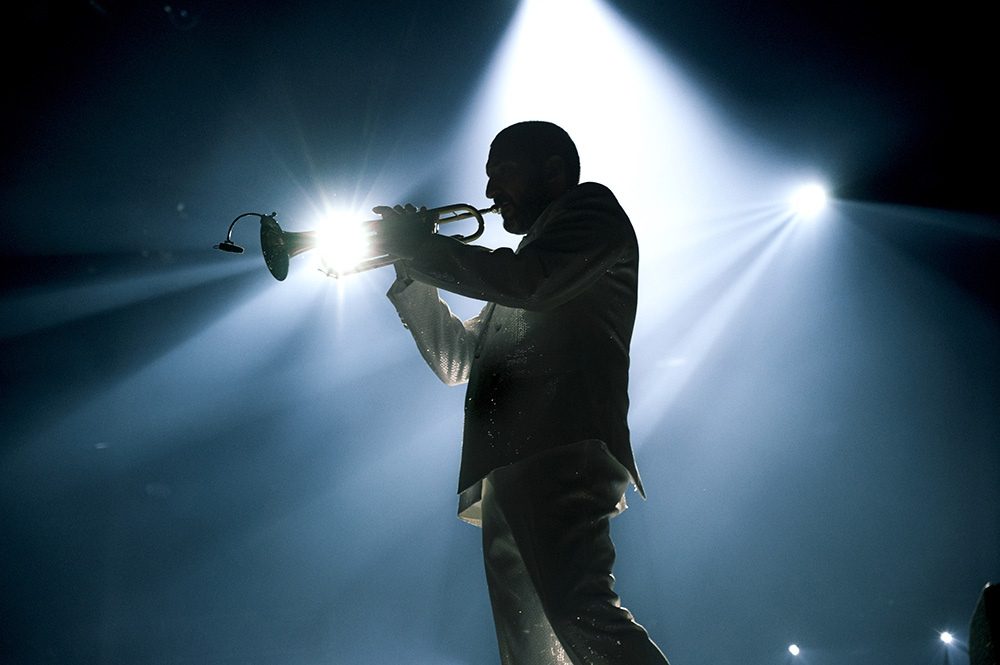
I see. They had sounds in their heads that they could not produce on the instrument.
No, because the trumpet cannot play the quarter tones. So he designed it, literally designed it, and went to the factories to see the instruments, and he asked them to build one just to see if it worked. And voila. This is how he came up with this idea, just to bring back to his father these quarter tones that they couldn't play.
Amazing. So in terms of the actual mechanics of the instrument, what did that involve to make it a quarter-tone trumpet?
Nothing big. Just an extra valve and an extra piston.
That’s it?
Yeah, just one extra piston, and every time you use it, it enables you to lower a quarter tone. So any note you play is lowered by one quarter. Very easy. And even himself, I mean, when he talks about it, he always says, “I don't understand why nobody did it before, because it's so simple. There’s nothing to it. I didn't invent anything. I just did it, because nobody did it before me."
So coming to you, did you grow up with that instrument?
Yes, when I started playing trumpet, I was seven years old and my dad, the first trumpet he gave me included this quarter tone because he didn't have any other one anyway. He gave me the trumpet with the quarter tone, so I've always had this weird instrument in my hand with the extra valve played with the left hand because the other ones you play with the right hand. Now if you give me a trumpet without that, I feel naked. I feel like there's something wrong, like something is missing.
I'm sure. Well, that's wonderful. You know, I'm a guitar player, but when I was a kid, I was enthralled with the trumpet. I was in awe of Herb Alpert. By the way, he’s nearly 90 years old and just released his 50th album. Anyway, I've always loved the trumpet, but when I first heard you play at the Atrium at Lincoln Center a few years back, I was hearing those quarter tones, but I was also hearing this amazing tone that you have. You have a truly distinctive voice on the instrument, and it's a pleasure to hear it. So coming to these albums, let’s start with the live concert. It’s an expansive performance, going in many directions from jazz to pop to rap, with scores of guests on stage. And you really feel the scene; you feel that big audience in this recording.
Thank so much.
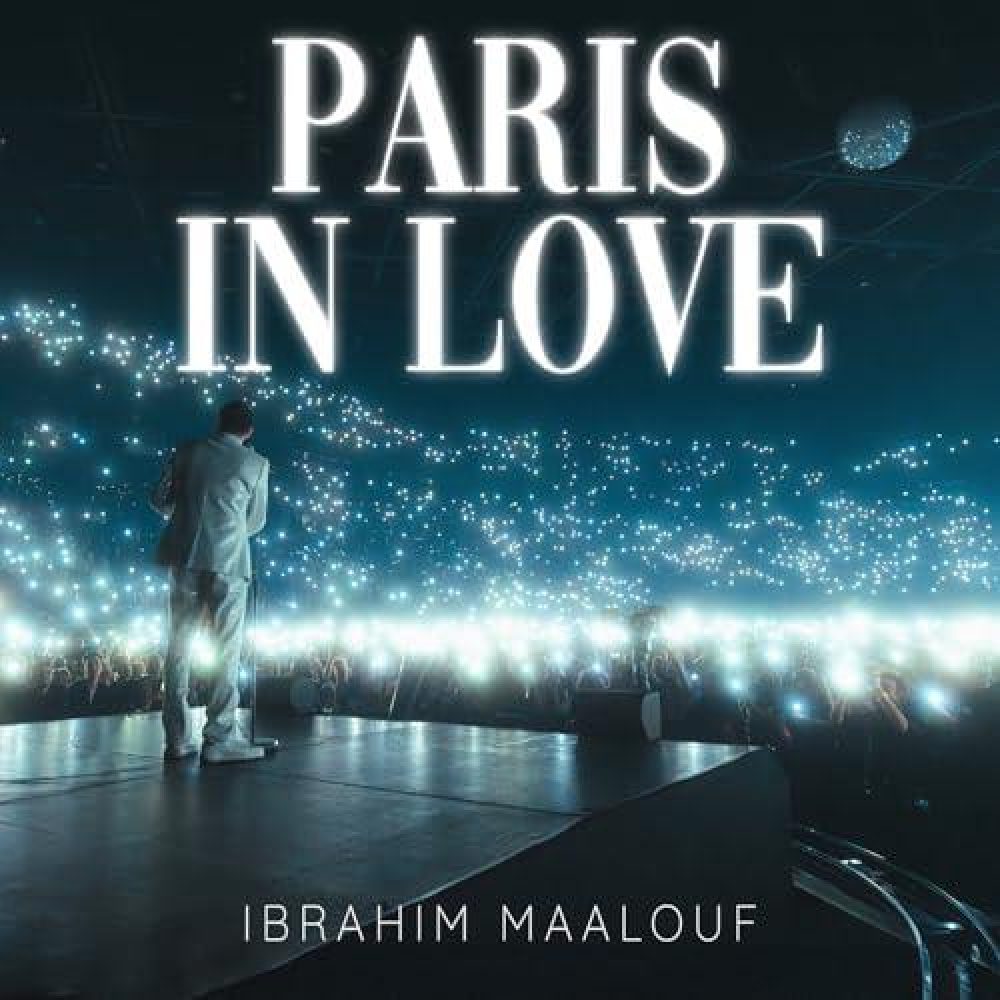
And you've got rappers and singers and this huge backing chorus. How many people did you have on stage for that concert?
My gosh, you mean the guests and like everyone?
Well, I'm not seeing the visual, but I can sort of imagine by listening to it. You had a lot of folks coming and going.
It was crazy. This is one thing I really love doing, and that’s sharing the stage with people who come from completely different places than where I am from. I'm talking culturally, even musically, anything. Music for me is really just a reason—we say prétext in French—to connect us with all kinds of people, all generations, all religions. I know that at my concerts, there are people who love jazz, and also some who don't ever listen to jazz. There are people who love ethnic music, Indian, African, Middle Eastern music. Some don't even know what that means. Some people listen to rap music or hard rock music, and they all come to my shows knowing that at some point I'm going to bring it up. At some point it's gonna happen, but all the rest of the show they're just curious and they listen and I like this feeling that when I'm doing a show, and especially the big shows, I give them the opportunity to discover things they would have never have listened to before.
My audience, most of them, if I'm being very honest, would never listen to hip-hop, because they wouldn't understand where hip-hop would connect in any way to my music, which is a big mistake because I've been listening to hip-hop since ever since I was young. I love hip-hop. I used to listen to Public Enemy.
Okay.
I used to listen to De La Soul, to Wu-Tang Clan, even Eminem. I was a fan of these big hip-hop bands. So why exclude it just because I would need to keep in mind the picture that I'm a jazz man or I'm a Middle Eastern musician or I'm a classical musician. You know, it's not so important for me the way you label me. The most important for me is the connection that we're creating. So when I'm on stage and I have the possibility, I like to bring with me all the people I can, and especially people who come from completely different worlds. So that's why there are so many people on stage, rappers, musicians, dancers.
Young students who are seeing the first show in their life and people who have been doing this job for 40 years, when they see the show like this, for me, it reminds me why we do music. It’s for this connection between us.
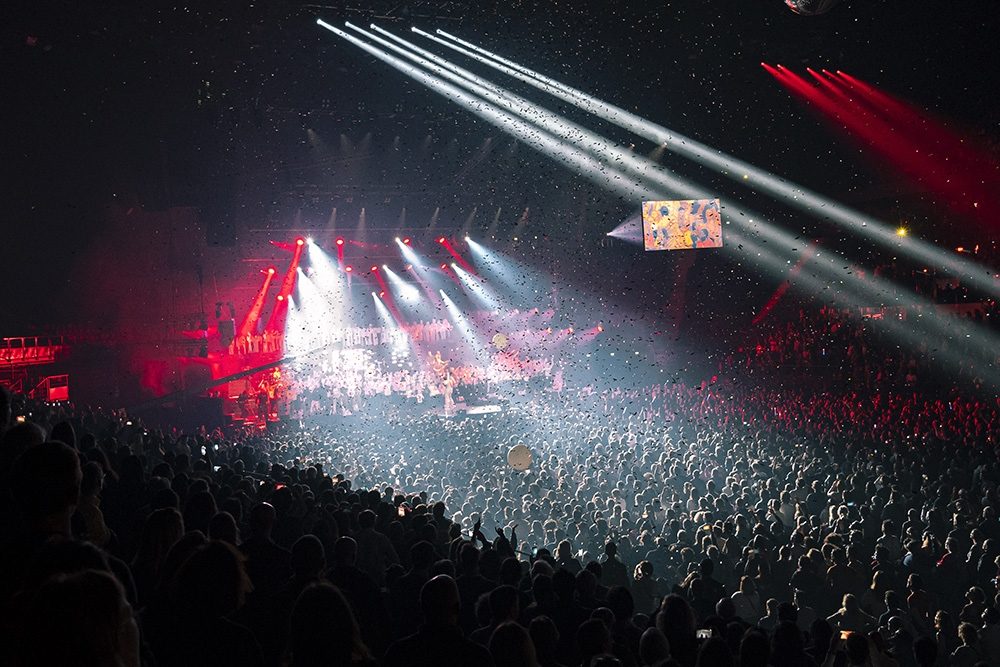
How often do you do a huge show like this as opposed to a more intimate show with a smaller ensemble. It must be a lot of work to pull together a show like this.
Yeah, I mean the big, big shows it's like… I'm not gonna hide it from you. In France, people know me, so when I do this kind of show, they know it's gonna be a huge celebration. I really prepare it, so this kind of show is like once a year or once every three years. But sometimes the tours we do can be really huge too. It’s not only the band and the small shows and then the big one. Even now, we're touring with the Trumpets of Michel Ange and the show is not as big as this, of course, but there are guests every time. It's a big show.
Let's talk about the Trumpets of Michel Ange. I understand that the album is a tribute to your father. There's a story that runs through these pieces. Tell me about that.
I would start by saying that the times we're living in now are not the happiest, right? When I see what's happening in my country, when I see what's happening in the Middle East, even when I see how Europe is now, or even the United States, I see this kind of permanent danger of fascism everywhere. It's scary. I have three children and I'm worried for them, honestly. I'm really worried for them, and for the future. If we would have talked 72 hours ago I wouldn't even think that my own family would be under the bombs right now in Beirut. And they are. They are. So you see? Things are moving very fast and not in the right direction. I've been feeling this for years now, honestly. I used to talk with my wife about this. I used to say, “There's something wrong. It feels to me there's something wrong. It smells bad.”
I always say that the music I do and I compose is like the soundtrack for a movie. It's the soundtrack of my life. I work on my music for years before it's released, for sometimes two, three, four years. There is music on the Trumpets of Michel Ange that I composed 30 years ago. I've been living with this music for a very long time. The pieces become the soundtrack of my life. And sometimes I need something specific. These last three, four years, I have badly needed happiness and joy. I need my children to dance and sing. I need us all to go live these moments of joy during the concerts and sing all together and dance all together and try to unite what remains possible to unite. And so for this album, I really wanted it to be joyful, very joyful.
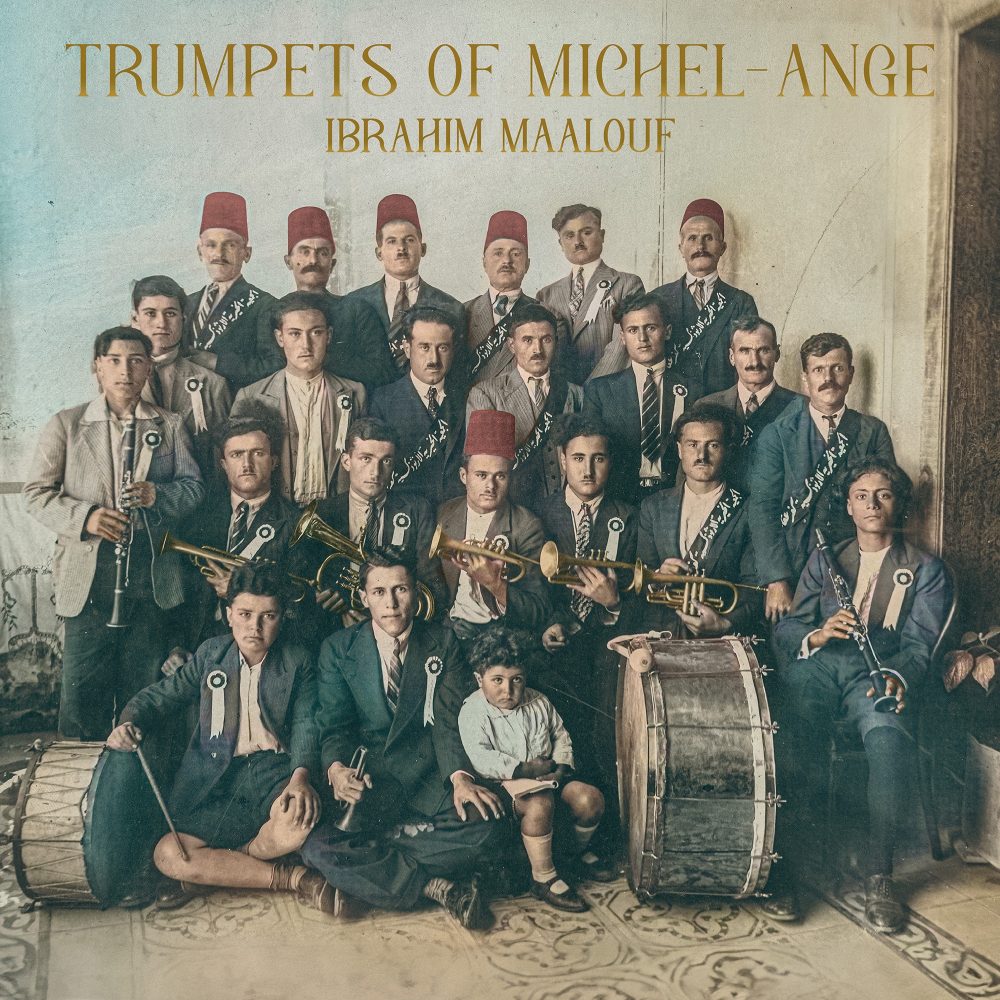
I got married four years ago. And four years ago, during my wedding, we jammed with my friends, with the musicians who are on this album, by the way. These guys on the album are my friends. The guitar player was a witness at my wedding, you know?
It’s in the family. Nice.
Yes, like family. Right after the wedding, the same night, we were all jamming and we came up with this piece that I called “The Proposal.” It's the first one of the album. It was just the result of an improvisation with my friends on the day of my wedding. And I was thinking, OK, this is what unites us all. A huge union, like a big wedding that allows and enables anyone to be with anyone they want. No limit, no religion, no nothing. So let's think about this album starting with this music. Then I can bring in all kinds of melodies I've been working on for years that celebrate this big union, this big wedding.
Speaking of that joy, the first song I heard from this album was “Love Anthem,” with that great video of kids dancing in what looks like Africa. We recently played that song as the opening of our new podcast season. So I have to ask you about this video. Where was that filmed?
It was filmed in Uganda. Yeah. I know it's surprising because it's not Middle Eastern at all. If you notice, all the guests in this album, they all come from a different place in the world and from a different musical world also: Trombone Shorty, Endea Owens, Toumani and Sidiki Diabaté….
Yes. We're going to talk about them.
Even Golshiteh Farhani, who is an amazing musician, but she's mostly a very big actress. She's Iranian, so for an Arab guy, Iran has nothing to do with the Arab culture. All of my guests on this album come from different worlds. The reason why I filmed this in Uganda and the reason why all my guests are from a world other than the Arab and Middle Eastern world, is that I really wanted my album to be inspired by my origins. I'm paying a tribute to this part of my culture. But at the same time, I want this music to be understood by anyone in this world, not only by Arabs. I don't want it to be an album for only one community, for only one kind of people. So when you say that you enjoyed “Love Anthem,” for me, it's the greatest thing I can hear because I don't think you're Arab.
Correct. I am not. But I'm steeped in African music. That’s our wheelhouse at Afropop. And that video just hit me on many levels. First of all, just the sheer joy of it and the beauty of the melody. And there’s a part in the middle where of drop into what sounds to me like a reggaeton, you know?
I know, yeah.
I love that. I love the rhythm changes.
Yeah, that's cool. I love South American music too. A big part of my family is from Chile. So I've always listened to salsa and Latin music. My album called S3NS is very much into Cuban music and all this. So I wanted also to have this little flavor of South American music. So for “Love Anthem,” I was thinking maybe I should contact a Brazilian dance troupe or something. Then suddenly I received a message on Instagram from these dancers in Uganda saying, “We love your music. We would love to work with you one day, if there's any opportunity.” So I sent “Love Anthem.”
They reached out to you. That's great.
And then they sent me many videos of them dancing on the song and I was like, “Okay guys. Let's do it.” I mean it's obvious, you know?
That's wonderful that your music was able to touch them to the point where they reached out to you, and then obviously threw their hearts and souls into it. I want to ask you about the song “Timeless,” where you have Toumani Diabaté and his son Sidiki. Toumani was a good friend of ours. I still can’t believe he's not with us anymore. But tell me about making this song “Timeless.”
Timeless is like summing up all the feeling of this album into one spiritual and rhythmical trance. I wanted to share something with artists who understand what I mean by sharing between all the generations. Sidiki and Toumani are also good friends of mine. I played with him 20 years ago at the Gnawa festival in Essaouira, Morocco. And Sidiki is a phenomenon. So to have a son and a father together when I'm paying tribute to my father on this album… My father is 85 and he doesn't play anymore so much. But I wanted him and my son to be on the album also. And Mathieu Chedid, the guitar player, is like my brother, and his link with his own father and grandmother is huge also. He's a pop star in France, you know?
So I was thinking, “Okay, I want this song to sound like a cycle where the old generation gives us something and we give something to the new generation.” We become the old generation and then, you know, the new generation comes to give to the next one. This is the cycle of life, right? So this is “Timeless,” something that is out of time, not touched by time. So we started inventing things. Sidiki came to the studio and we started imagining what we could do. Toumani couldn't make it to the studio, so he recorded in Mali. Mathieu came to the studio and we played with him. I had my song, I had my music, you know, the whole picture of it. But then, I needed to add my son and my father. That was the only thing missing.
So the trumpet that you hear at the very end of the song, this long improvisation, it comes from a duet I did with my father eight years ago. It's hard to hear, but… this is hard to say… It's the only concert my father attended of mine in 25 years.
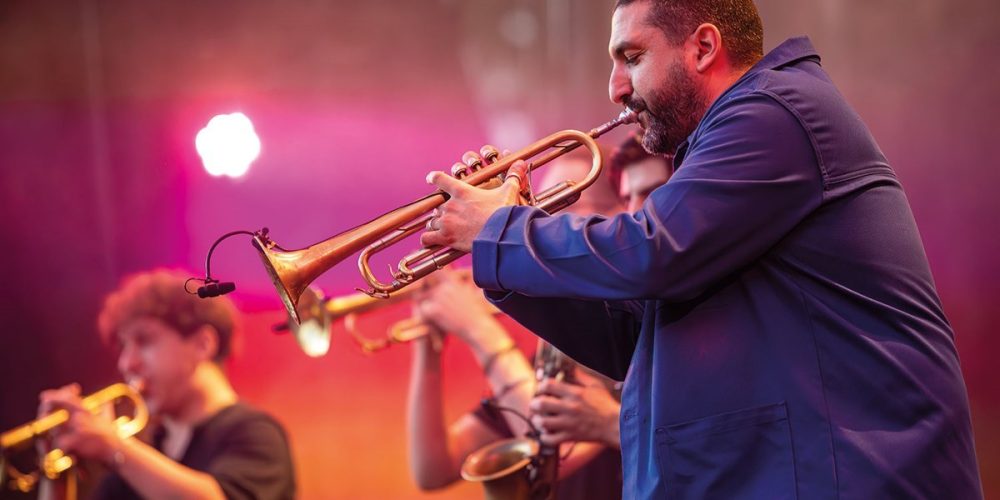
Really? Why hasn't he come to your concerts?
It's not understandable, I don't know. But he came to this concert, and I was really moved by the fact that he was there. So I invited him on stage and people asked him to play something. He took the trumpet and he played something that was recorded by people in the audience. And I played with him, just one note, from the beginning to the end. That was something very moving for me and very strong, a powerful moment. So I took this moment and I put it in this song, "Timeless." And then at the very, very, very, very end, you can hear my son, who was one and a half—he’s three and a half now—but he was one and a half then, blowing his first notes ever on the trumpet. You see?
Amazing.
Look, in “Timeless,” I don't know if I will have so much opportunities to talk about this, but it's crazy because you can hear the last concert my father did in his life, which is when he played with me at this only show he attended of mine. And you can hear in the same song the first notes ever that my son played. That's crazy, right? All recorded on one song.
That is crazy. I can't wait to go back and listen again now that you've told me all that. Let’s talk about the last song on the album, “Zajal.” Some years ago, we did a series of shows about the musical history of Al Andalus. I remember learning about the zajal song form in the context of Andalusian music. Tell me about that song and why you made it the concluding track on the album.
There are always many, many layers. It's always difficult to choose which story you want to tell about when you talk about one song. I'm curious to know what touched you in this song.
Well, one thing is that I'm very conscious of rhythms and this song has a lot of strong triplet rhythms, ternary rhythm, which always gets me going. I love ternary rhythms. This song goes back and forth, if I'm not mistaken. It alternates between ternary and binary rhythm and I thought that was interesting.
I’m trying to recall what I knew about zajal as a song form. For me, it just evoked the history of Andalusia, which is just such a fascinating and not well understood history. So much culture came into Europe from the Arab world and North Africa during that time, everything from musical instruments to words and poetry styles. I'm always fascinated by that.
Zajal specifically, is a very traditional thing that they do in the Middle East. It's a moment of creation, a moment of improvisation that is very strong. It's usually done during celebrations, and you have all the wise old men who write poetry and improvise, and they usually know how to sing very well in the village. They celebrate by inventing poetry and inventing melodies.
Right. Improvised lyrics. I remember that now.
It’s very intense. I saw them with my eyes. They have papers, empty papers with pens. There's nothing written. It's just music that they clap to and they start inventing things, you know, inventing words and poetry. We were talking about hip-hop. Well, it's somehow the same kind of word battles that you can see in hip-hop culture, right? The call and response thing, the way the words have to be poetry, and they can have double meanings. It's very interesting. I think it's a tradition that we don't see so much anymore. And that deserves also to be known more. Also, if I remember right, zajal was even recognized by UNESCO, as a World Cultural Heritage.
I did not know that. It joins company with highlife and Congolese rumba and other genres that have been recognized by UNESCO. That's wonderful. Well, coming at the end of the album, which you started with the proposal, this is kind of the wedding reception, right?
Yeah, absolutely. That's right.
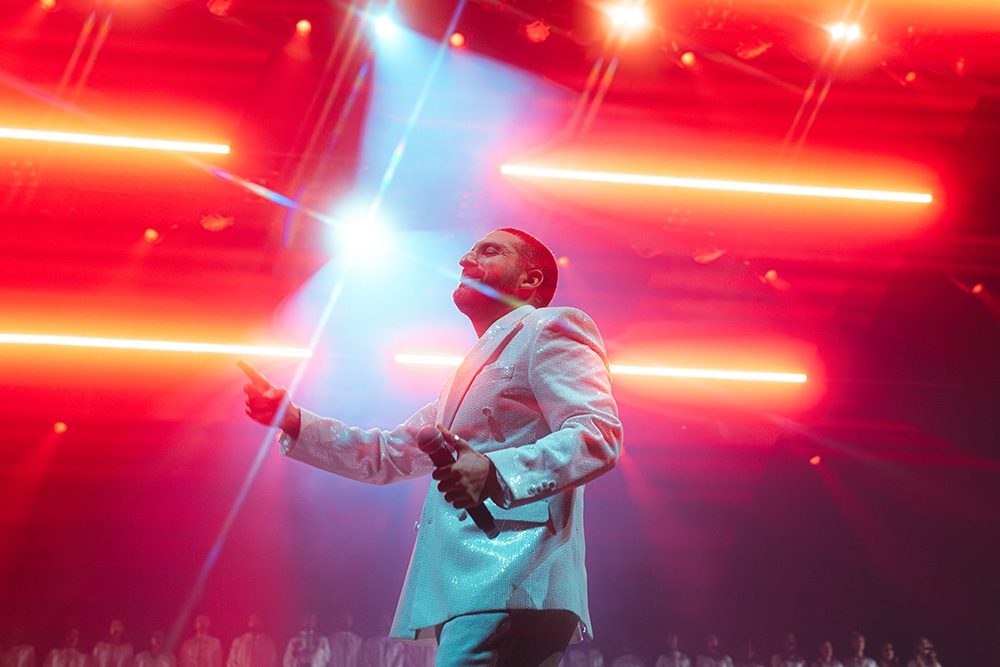
I wanted to say one other thing about hip-hop and the live concert. I think it was on the song “I'm Feeling Good” where we hear this very intense rhythmic rap, and then you play right after that, but it's very different from your playing elsewhere. It's as if you're rapping with your trumpet. It’s one of those moments where I hear you connecting, as you say, but responding in a very specific way to what you're hearing. I love that.
Thank you. You’re talking about this “I’m Feeling Good” and the fact that you can use trumpet differently. You know, when you invite people to your home sometimes these people have different ways to say things, or different sensibilities. And to connect to them, you have to move a little bit towards them to make them also understand what you are doing and how your own sensibility is, right? I'm knocking on the door of the hip-hop family and saying, “Hey guys, I know I'm not a hip-hop musician, but I would love to be part of your family at least for some time because I love what you guys do.” In my opinion, this is how you connect to people. And this is how people understand you better and then they will accept you with your differences. This is the best message we can send to the people of the world, especially those who don't understand how we can share the same world when we are so different. Through music, we succeed. I'm not at all a hip-hop guy. I'm a classical guy. If you look at my stuff here, look what is here. Look, (reaching for a score) Saint-Saens, I'm studying Saint-Saens.
It's not Public Enemy.
You see, I'm a classical music guy. I write music all the time here. This is the Gustav Mahler Symphony score. So I'm not a hip-hop guy at all, but I love hip-hop. And when you want to share the same world, once they see that, they say, “Here's a trumpet guy who plays Arabic music and classical music. He says he's a jazz man, but let's try.” And then they will be curious to know more about my culture, about where I'm from. This is how we share the same world, even when we are 180 degrees different.
I relate to that. I spent a lot of time in Africa learning African guitar styles. And it was kind of like that. By my trying to learn the tradition, whether it was the griot tradition in Mali or mbira music in Zimbabwe, there's a thing that happens when the other person feels respected by the fact that you are trying to understand what they do. But at the same time, you're never going to do it the way they do. You bring yourself. And so things start to go back and forth and you end up having these very beautiful exchanges.
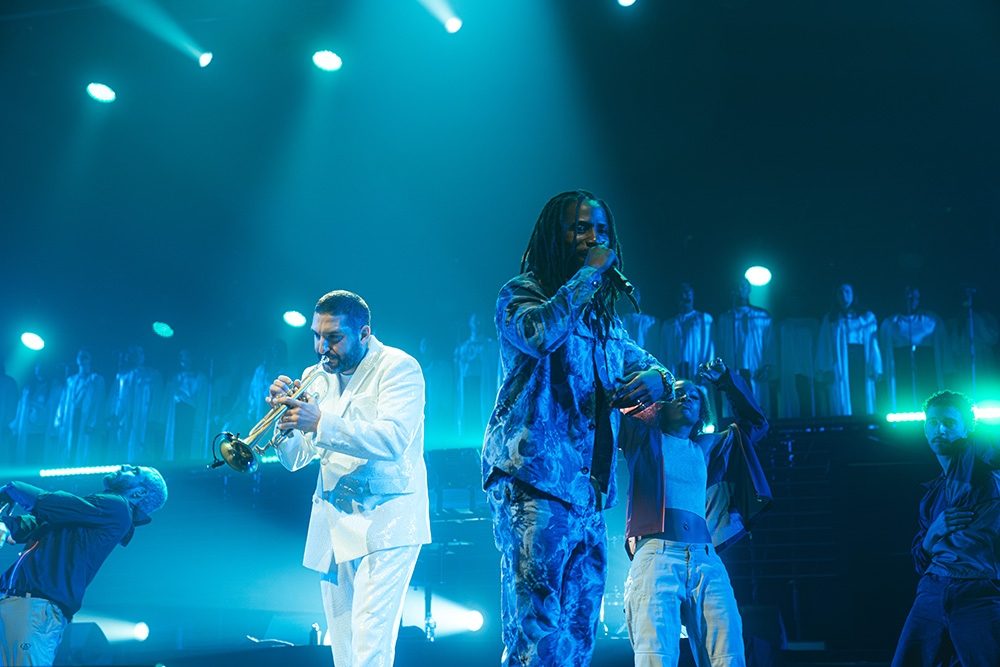
Exactly. Take the song, “The Pope” (from the Paris in Love live album) that we did with D Smoke. When I told people I want to collaborate with this guy, everyone said that he would never do anything with you. “He doesn't know anything about who you are.” I said, why not? They said, but he's the guy who just won this rhythm-and-flow Netflix thing about hip-hop with Cardi B and Snoop Dogg.
Yes.
Why would he even give a shit about a trumpet guy who plays quarter tones? Come on, a Lebanese man? And I was like, please give it a chance. So when we contacted him, we discovered that this guy is brilliant. He's a very smart guy. He's a Spanish teacher in Inglewood. He's a guy who made his path through all this world with huge cleverness, you know, building his life in the hip-hop world with something extremely interesting. And when I reached out to him and I said, “Here is the music, let's do something,” he was very open to it. These kind of collaborations barely happen in the hip-hop world. And that's why it's so interesting. That's why we have to talk about it. This is how we change the music. This is how we make better music and make better people also.
What a pleasure to speak with you again and good luck with everything. I love what you're doing. I'm sure that there are many wonderful surprises ahead in your career, and we'll talk again at some point. But thank you again and thanks for these two great albums.
Thank you. It was a pleasure. And thank you so much for giving interest to all this.
Related Audio Programs
